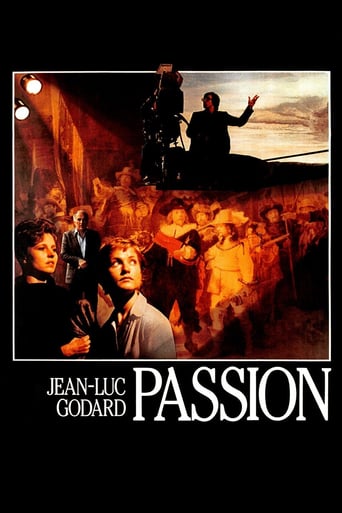gavin6942
On a movie set, in a factory, and at a hotel, Godard explores the nature of work, love and film making. While Solidarity takes on the Polish government, a Polish film director, Jerzy, is stuck in France making a film for TV. He's over budget and uninspired; the film, called "Passion," seems static and bloodless.Godard met Hanna Schygulla in Hollywood when she was shooting "One from the Heart" with Francis Ford Coppola. Godard asked Schygulla at once if she wanted to participate in his new film but she first wanted to see a synopsis. Soon after Godard sent her a three-page summary in English. The film marks Godard's reunion with cinematographer Raoul Coutard; the last time they had worked together was on "Week-end" (1967), which is usually considered the end of the French New Wave.Of Godard's later (Second Wave) films, this may be the most artistic. He not only references works of art in the film several times over, but even makes film an art within an art. The casting of little people for the film-within-a-film is interesting, and adds that surreal quality to the movies that people of unusual size tend to do. This is definitely worth a repeat viewing.
Claudio Carvalho
Sometimes I question myself why I insist on watching films made by Jean-Luc Godard, the most overrated and pretentious director of the cinema history. "Passion" has not been released on VHS or DVD in Brazil, but I have unfortunately bought an imported VHS and today I have decided to watch it. What a waste of time! There is neither storyline nor screenplay; the characters have the first name of each actor or actress; there is no edition and the viewer sees disjointed scenes on the screen. This dreadful mess is about a Polish director, who is the alter-ego of Godard, that is filming a movie without story or money and has simultaneous affair with the owner of a hotel and a worker of a factory. My vote is one (awful).Title (Brazil): Not Available.
stevemac
If one were to hold up a camera to life and to film for ninety minutes, the result would be, more than likely, a boring snapshot of the banal and mundane. These snapshots of life would have no narrative, would be disjointed and chaotic, for such is life. Godard's Passion struck me as just that, a snapshot of the banality of life, the disconnected, seemingly meaningless misadventures of ordinary people, captured in one moment of time. But of course, these are not ordinary people in ordinary circumstances, these are the creations of Godard's imagination, yet the presentation of the content of the film is without structure, narrative or any of the Hollywood conventions of 'good filmmaking'. I found the film compelling and intriguing; I wanted to know more about the people and the universe that they populated. The lack of narrative structure was not a negative factor in my enjoyment of the film, for the anarchic content was, of itself, enough to keep my mind from wandering away from it. Godard's reflexive jibes at cinema convention were acerbic and witty, carrying with them a tremendous knowledge of the mechanics of filmmaking. The story of Passion, what story there is, is subservient to the process of filmmaking and Godard's desire to subvert it. For me, that is what makes this film so entertaining.The influence of Godard's work on other filmmakers is probably most profound in European cinema where the role of the Auteur is, if not quite nurtured, respected. It was a delightful surprise for me when, having seen Passion, I began to draw connections between Godard's storytelling and popular TV comedy. The First Series of the BBC comedy 'The Office', by Ricky Gervais and Stephen Merchant, leapt to mind as I mulled over Passion. The non-structure of Passion is very much evident in The Office, where the stories unfold as snapshots and moments in time, captured, and heavily influenced by the presence of the cameras. The Office is probably the most original piece of TV comedy since Monty Python's Flying Circus, yet I can see the influence of filmmakers like Godard in its presentation. Although there exists an A plot, B plot and guest plots, typical TV structure, in The Office, it is the presentation that makes all the difference. If handled in a more traditional fashion, it is highly unlikely that The Office would ever have been made, never mind popular. Even the origins of The Office pay homage to the anti-structural approach of filmmakers like Godard. Conceived and performed as an adlib piece on a BBC director's course by Gervais and Merchant, it shined with originality and a deep knowledge of and healthy disrespect for, convention; much like Godard really.The success of The Office owes much to its originality and wit but also to the possibility that the audience is searching for a new experience in terms of storytelling both on television and film. The irony is that this type of storytelling has been with us since Godard and long before Godard. Perhaps the audience has finally caught up with the filmmakers.
Behzad
Cinema, just like other forms of art is an expression of feelings. That's what Art is all about! If I make a movie, first of all I am making it for myself. That's how I have felt. I wont force anyone to like my job. Some viewers establish communication, some dont. No Rebuke!


